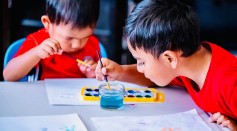Learning
10% of US Students are English Learners

Families Can Support Kids' Mental Health Whether They're Learning Remotely or at School – Here's How

It's Never Too Late to Learn Another Language

Varying Natural Speech Sounds Affect the Learning of Dyslexic People

Scientists Link Psychosis to Dopamine and the Brain’s Ability to Process Novel Situations
‘Lightning Strikes’ in the Process of Learning
Napping Babies Have Better Memory and Learn Faster
Most Popular

How Technology Is Changing the Real Estate Industry?

Study Reveals High Turnover in Scientific Research Careers: What This Means for Future Scientists

How a Plant-Based Diet Can Protect Against Breast Cancer: Insights from Nutrition Research

Practical Steps to Future-Proof Your Money to Create Financial Security






